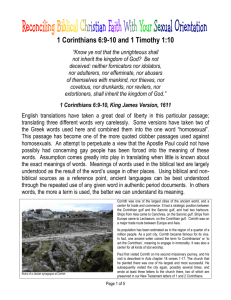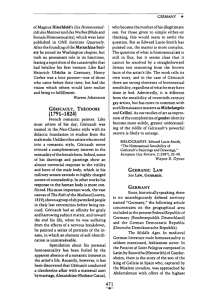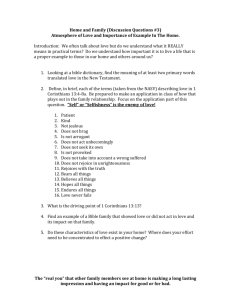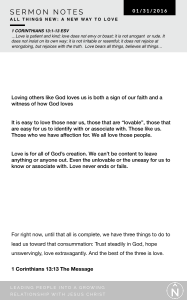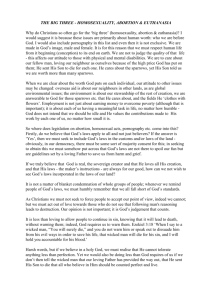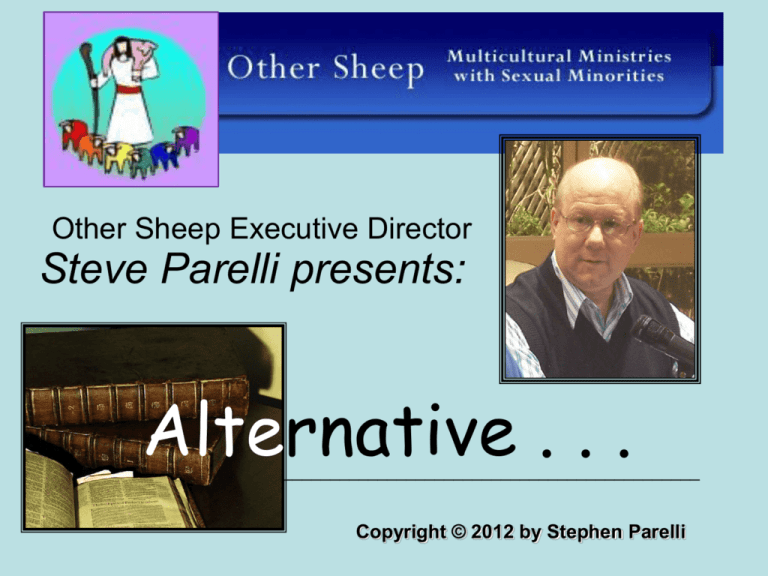
Other Sheep Executive Director
Steve Parelli presents:
Alternative . . .
____________________________________________
Copyright © 2012 by Stephen Parelli
. . . theological
perspectives
on key Bible
passages
concerning
sexual
minorities
I Corinthians 6:9-10
and I Timothy 1:10
μαλακοι
αρσενοκοιται
Corinth
Chapter II
Two NT Greek Words
• IntroductionThe Texts in Question
• malakoi μαλακοιWhy ‘soft’ does not mean ‘homosexual’
• arsenokoitai αρσενοκοιταιWhat Zues and Naas teach us about
homosexuality
Chapter II
Two NT Greek Words
Introduction- The Texts in Question
I Corinthians 6:9
and
I Timothy 1:10
Part One
I Corinthians 6:9-10 KJV
9. Know ye not that the unrighteous shall
not inherit the kingdom of God? Be not
deceived: neither fornicators, nor
idolaters, nor adulterers, . . .
nor effeminate,
μαλακοι
nor abusers of themselves
with mankind,
αρσενοκοιται
I Timothy 1:10
10. Nor thieves, nor covetous, nor drunkards,
nor revilers, nor extortioners, shall inherit the
kingdom of God.
nor effeminate
μαλακοι
malakoi (pl.)
malakos (sg.)
I Timothy 1:10
nor abusers of
themselves with
mankind
αρσενοκοιται
arsenokoitai (pl.)
arsenokoites (sg.)
Chapter II
Two NT Greek Words
The first word:
malakoi μαλακοιWhy ‘soft’ does not mean
‘homosexual.’
Part Two
Chapter II
Two NT Greek Words
The first word:
malakoi μαλακοι
Its Translation by
Modern Bible Versions
I Corinthians 6:9
μαλακοι
1995 New American
effeminate
Standard Bible NASB
A heterosexual
man can be male prostitutes
1971
New Revised
a male
prostitute;
this
Standard
Version
rendering
nothing
1611
Kingsays
James
Version effeminate
about
1901 definitive
American
Standard effeminate
Version(especially
homosexuals
Basicgay
English
Bible is less than a man
committed
couples).
Darby Version
those who make
women of themselves
I Corinthians 6:9
A heterosexual
man can
be
Webster’s
Bible
a male prostitute; this
Weymouth
NT
rendering
says nothing
definitive about
World
English Bible
homosexuals
(especially
committed
gay
couples).
Young’s Literal
Translation
1984 New International
Version
μαλακοι
effeminate
any who are guilty of
unnatural crime both words
male prostitutes
effeminate
male prostetitutes
This
is a very narrow,
I Corinthians
6:9unscholarly,
μαλακοι
slanted
rendering
especially
because
This translation
2002
The Message
those who use and
the
statement
is
given
as
fact
abuse each other/sex
would seem to NOT
without
any
qualifying
words
like
1987
Amplified
Bible
those
who participate in
condemn loving,
homosexuality
both words
“some
think,”
or
“evidence
is
not
consenting
2004 conclusive.”
New LivingThis is poor
male prostitutes
relationships.
Translation
workmanship
on the part of the
2001 English Standard men who practice
translator(s).
with footnote
Version
homosexuality
ESV Footnote: The two Greek terms translated by
this phrase refer to the passive and active partners
in consensual homosexual acts
I Corinthians 6:9-10
μαλακοι
1995 Contemporary
pervert
English Version
1982 New King James homosexuals (Footnote:
“That is, catamites”)
Version
A married
couplethe effeminate
1994
21stheterosexual
Century King
James
Version- is that
enjoy anal
sex together
1969
New Life
Version
perversion?
A pastor
who men who act like
women
counsels heterosexual couples
2003 Holman Christian male prostitutes
not to engage
in oral
sex: is oral
Standard
Bible
a perversion?
1998 sex
New
International men who are prostitutes
Reader’s Version
I Corinthians 6:9-10
2001 Wycliffe New
Testament
Worldwide
English NT
It1984
is veryNew
obvious, after
lookingInternational
at this list of
Version UK
renderings, that
2001 Today’s New
translators
don’t have
International
a clue asVersion
to what “soft”
means.
μαλακοι
neither lechers [lewd
person] against mankind
those who commit
adultery of any kind
male prostitutes
male
prostitutes
μαλακοι “Soft”
Definition/ Study:
“Soft”
The Greek word here, rendered
Matt 11:8
“effeminate” by the 1611 KJ
But what went ye out
translators, means “Soft”
The
Children
Free
for to
see? Are
A man
by Jeff Miner
and John
Tyler
clothed
in soft
Connoley,
16-18
raiment?pages
Behold,
In reference to individual men,
they that wear soft
“soft” could refer to
clothing are in king’s
houses (1) moral weaknesses in general,
Here, the reference
is to things, not
individuals.
or, more specifically,
(2) to male prostitution.
μαλακοι = general moral weaknesses
Definition/ Study:
“Soft”
a reference to general moral weakness
The Children
Are Free
by Jeff Miner
and John Tyler
Connoley,
pages 16-18
Fearful –
A lack of courage; more
interested in pleasure than in
duty
Vain –
Preoccupied with making themselves more attractive,
“whether they were trying to attract men or women”
Self-indulgent –
“Laziness, degeneracy, decadence; expensive things,
dressing well, over eating”
Hence the use of the word “effeminate”
(which is intolerable misogynistic thinking)
μαλακοι = general moral weaknesses
Definition/ Study:
“Soft”
a reference to general moral weakness
Fearful –
A lack of courage; more interested in pleasure than in duty
Vain –
The Children
Are Free
by Jeff Miner
and John Tyler
Connoley,
pages 16-18
Preoccupied with making themselves
more attractive, “whether they were
trying to attract men or women”
Self-indulgent –
“Laziness, degeneracy, decadence; expensive things,
dressing well, over eating”
Hence the use of the word “effeminate”
(which is intolerable misogynistic thinking)
μαλακοι = general moral weaknesses
Definition/ Study:
“Soft”
a reference to general moral weakness
Fearful –
A lack of courage; more interested in pleasure than in duty
Vain –
The Children
Are Free
by Jeff Miner
and John Tyler
Connoley,
pages 16-18
Preoccupied with making themselves more attractive,
“whether they were trying to attract men or women”
Self-indulgent –
Laziness, degeneracy, decadence;
expensive things, dressing well,
over eating
Hence the use of the word “effeminate” KJV (which
is intolerable misogynistic thinking)
“Soft” μαλακοι = general moral weaknesses
Fear, Vainity and Self-indugence were
“woman-like”
In the patriarchal culture of the time, women
were thought to be weaker than men, more
fearful, more vulnerable, more vain.
Thus men who ate too much, liked expensive
things, were lazy, or liked to dress well were
considered “soft like a woman.”
Although this type of misogynistic thinking is
intolerable in our modern society, it was
common in ancient times.
-hence the use of the word “effeminate” KJV (which,
again, is intolerable misogynistic thinking)
The Children Are Free by Jeff Miner and John Tyler Connoley, page 17
“Soft” μαλακοι = general moral weaknesses
Perhaps, specifically: Male prostitutes
• some recent studies suggest this
rendering
• rendered “male prostitutes” in the NIV and
NRSV (widely used modern English
translations)
• “soft” (malakoi) may suggest the male
prostitutes acted as receptive partners in
intercourse (“women like”)
• context: since Paul is listing “sexual sins,”
inference may suggest “male prostitutes”
The Children Are Free by Jeff Miner and John Tyler Connoley, page 17
Dale Martin
on μαλακοι
implied
misogyny
The translation of malokoi in Bible versions
From the end of the sixteenth century to the twentieth, the
preferred translation was “effeminate.”
A curious shift takes place in the mid-twentieth century.
The translation of malakos as “effeminate” is
universally rejected, and some term that denotes a
particular sexual action or orientation is substituted.
Malakos = the feminine = moral condemnation
Sex and the
Single Savior
by Dale B. Martin,
pages 43-49
As a term of moral condemnation, all of the
following vices can be summed up in one
ancient category, the feminine:
• lazy men (Xenophon)
• avoidance of the hard work of philosophy
(Epicetus and the Cynic Epistles)
• cowards (Plutarch and Joseph)
Malakos = the feminine = moral condemnation
men who live lives of decadence and luxury
Dale Martin
(Xenophon and Plutarch)
on μαλακοι
implied
misogyny
Sex and the
Single Savior
by Dale B. Martin,
pages 43-49
o they drink too much wine, have too much sex
(with men or women), love gourmet food, and
hire professional cooks
a man who is weak in battle (Josephus)
a man who is reluctant to commit suicide
(Josephus)
a man who studies a lot (Dio Chrysostom)
a man who pretties himself up to further his
heterosexual (or homosexual) exploits
(Ecclesiazusae 1058)
a man who seduces other men’s wives (Latin:
Roman playwrite Plautus)
Malakos – it’s usage in ancient times
Malakos was a rather broad social category.
Dale Martin
on μαλακοι
In moral contexts malakos always referred either
obviously or obliquely to the feminine.
To say that malakos meant a man who was penetrated
is simply wrong. All penetrated men were malakoi, but
not all malakoi were penetrated men.
There is no historical reason to take malakos as a
specific reference to the penetrated man in homosexual
intercourse. It is even less defensible to narrow that
reference down further to mean “male prostitute.”
Sex and the Single Savior by Dale B. Martin, pages 43-49
Dale Martin
on μαλακοι
implied
misogyny
Malakos – it’s usage in ancient times
The real problem with being penetrated was
that it implicated the man in the feminine, and
malakos referred not to the penetration per se
but to the perceived aspects of the femaleness
associated with it (misogyny).
People could use malakos as an insult directed
against men who love women too much.
Sex and the Single Savior by Dale B. Martin, pages 43-49
Malakos – it’s usage in context with kinds of loves
On the superiority of one
kindisof love over another kind
What
(man for man; man for
woman,
and woman for woman),
striking
about
each opposing side accuses
the other
these texts
is of effeminacy and
can claim some logical grounds
their for doing so
male-male love is the most manly (Plato’s Symposium)
misogyny.
At
male-female love is “moist,” “housebound,” “unmanly,”
here(taismalaka) (Plutarch’s
and implicated in issue
“softness”
the
ancient
Dialogue on Love)
horror
the demonstrate their
Men who fall in love
with of
women
feminine.
effeminacy (malakia) and weakness by the fact that they
are controlled by women
Dale Martin
Heterosexaul sex taints a man with
on μαλακοι
femininity
Sex and the Single Savior by Dale B. Martin,
pages 43-49
The meaning of the word is clear. Malakos means
“effeminate.” What do we then tell our congregations
“effeminacy” means? In the ancient world a man
could be condemned as effeminate for
•
•
•
•
•
eating too much (a buffet lunch)
Dale Martin
on μαλακοι
drinking too much (free refills)
wearing brand
name
underwear
Kline)
The
list could
go on (Calvin
– and that
contributed
to on
thehis
usefulness
of the cap)
wearing much
of anything
head (baseball
a weapon.
It was
a malleable
caring for hisword
skin as
(creams,
lotions);
wearing
cologne
or aftershavecondemnation.
• dancing too much
• enjoying sex with women too much; masturbating
Sex and the Single Savior by Dale B. Martin, pages 43-49
Dale Martin
μαλακοι
=
on
μαλακοι
effeminate
misogyny
Cooking,
house
cleaning.
Taking piano
lessons, ballet
dancing;
singing falsetto
in the men and
boys’ choir
Shaving one’s
body hair
Malakos – Do we condemn what Paul
and his readers are likely to have
considered effeminate?
Or do we condemn only those things that
one’s culture considers effeminate?
Or do we just narrow the category to
include only those people most heterosexist
Christians would really like to condemn:
“gays” and “manly men” who are careless
enough to get caught?
Sex and the Single Savior by Dale B. Martin,pages 43-49
μαλακοι = effeminate
Modern scholars have conveniently narrowed the category
to include only those people most heterosexist Christians
would really like to condemn: “gays.”
Condemning penetrated men for being effeminate [not
for being penetrated – see above] would also
implicate us in a more elusive and pervasive problem:
the misogyny of degrading the penetrated.
The ancient condemnation of the penetrated man was
possible only because sexist ideology had already
inscribed the inferiority of women into heterosexual
sex.
Dale Martin
To be penetrated was to be inferior
on μαλακοι
because women were inferior.
Sex and the Single Savior by Dale B. Martin, pages 43-49
Chapter II
Two NT Greek Words
The second word:
Arsenokoitai αρσενοκοιταιWhat Zues and Naas teach us about
homosexuality.
• Its Translation by Modern Bible Versions
• Five Attempts at Unlocking the Meaning of
this Word
Part Three
I Timothy 1:9-10 KJV
(v9) The law is not
made for a righteous
man, but for the
lawless . . . (v10) For
whoremongers, for
them that defile
themselves with
mankind, . . .
I Corinthians 6:9
αρσενοκοιται
Chapter II
Two NT Greek Words
The second word:
arsenokoitai αρσενοκοιται
Its Translation by
Modern Bible Versions
αρσενοκοιται
I Corinthians 6:9
I Timothy 1:10
New International Version (NIV, 1973, 1984)
homosexual offenders
perverts
New American Standard Bible (NASB, 1960,1995)
homosexuals
homosexuals,
footnote: Lev. 18:22
The Message (MSG, 1993, 2002)
use and abuse sex
riding roughshod
over God, life, sex
αρσενοκοιται
I Corinthians 6:9
I Timothy 1:10
New Living Translation (NLT, 1996, 2004)
homosexuals
homosexuals
King James Version (KJV, 1611)
abusers of themselves
them that defile
with mankind
themselves with mankind
English Standard Version (ESV, 2001)
men who practice
homosexuality
men who practice
homosexuality
αρσενοκοιται
I Corinthians 6:9
I Timothy 1:10
The Amplified (AMP, 1954,1987)
those who participate in
homosexuality (both Greek
those who abuse
themselves with men
words)
Contemporary English Version (1995)
behaves like a
who live as
homosexual
homosexuals
New King James Version (NKJV, 1982)
sodomites
sodomites
αρσενοκοιται
I Corinthians 6:9
I Timothy 1:10
21 Century King James Version (KJ21, 1994)
abusers of themselves
those who defile
with mankind
themselves with mankind
American Standard Version (ASV, 1901)
abusers of themselves
abusers of
with mankind
themselves with men
Young’s Literal Translation (YLT)
sodomites
sodomites
αρσενοκοιται
I Corinthians 6:9
I Timothy 1:10
Darby Translation (Darby)
who abuse themselves
sodomites
with men
New Life Version (NLV, 1969)
people who do sex sins
people who do sex
with their own sex
sins with their own sex
Holman Christian Standard Bible (HCSB, 1999,
2003
homosexuals
homosexuals
αρσενοκοιται
I Corinthians 6:9
I Timothy 1:10
New International Reader’s Version (NIRV, 1996,
1998)
men who commit
those who have a
homosexual acts
twisted view of sex
Wycliffe New Testament (WYC, 2001)
they that do lechery with them that do lechery
men
with men
Worldwide English (New Testament) (WE)
those who commit
adultery of any kind
men who have sex
with other men
αρσενοκοιται
I Corinthians 6:9
I Timothy 1:10
New International Version – UK (VIVUK, 1973, 1984)
homosexual offenders
perverts
Today’s New International Version (TNIV, 2001,
2005)
practicing homosexuals
those practicing
homosexuality
αρσενοκοιται
The Children Are Free,
by Jeff Miner and John
Tyler Connoley, pages
16-18
Definition/ Study:
Because of its rarity, we can only
guess at what the word means.
The following leaves us with no
final answers:
– It is a compound word
– Its usage before Paul
– Its usage after Paul
– Its context: It is set in “lists”
– Its remote possible link to the
LXX
Chapter II
Two NT Greek Words
The second word:
arsenokoitai αρσενοκοιται
Five Attempts at Unlocking it’s
Meaning:
It is a compound word
Its usage before Paul
Its usage after Paul
Its context: It is set in “lists”
Its remote possible link to the LXX
Five Attempts at Unlocking
the Meaning of:
arsenokoitai αρσενοκοιται
It is a compound word
Its usage before Paul
Its usage after Paul
Its context: It is set in “lists”
Its remote possible link to the LXX
αρσενοκοιται
Definition/ Study:
It is a compound word
Christianity,
Social
Tolerance, and
Homosexuality,
by John
Boswell,
page
342
αρσενo-κοιται = male-bed
koitai κοιται “is a coarse word,
generally denoting base or
licentious sexual activities;
corresponds to the vulgar
English word ‘f***er’ ”
αρσενοκοιται
Definition/ Study:
It is a compound word
Christianity,
Social
Tolerance, and
Homosexuality,
by John
Boswell,
pages 342-244
αρσενo-κοιται = male-bed
arseno αρσενo, means male; “its
relationship to koitai is ambigous:
If male is the object, then αρσενo-κοιται
refers to someone who f***ks men or
boys
If male is adjectival, then αρσενo-κοιται
refers to male prostitutes who take the
“active role with either men or
women.”
αρσενοκοιται
Definition/ Study:
It is a compound word
Christianity,
Social
Tolerance, and
Homosexuality,
by John
Boswell,
pages 342-243
αρσενo-κοιται = male-bed
“The claim that this word ‘obviously’
means ‘homosexual’ defies linguistic
evidence and common sense.”
The definition of a compound word
is not ‘obviously’ known by the
definition of its root word
components. For example:
αρσενo-κοιται = male-bed
Definition/ Study:
A compound word is not ‘obviously’ known
by its root word components:
Compare and Contrast These Compound Words:
Christianity,
Social
Tolerance, and
Homosexuality,
by John
Boswell,
pages 342-343
Pyro[fire]mania = obsession with fire
[pyro-‘fire’ is the object of ‘mania’]
Nympho[bride]mania = obsession with
men [nympho-’bride’ is adjectival and
describes ‘mania’]; nymphomania
does not mean obsession with women
[nympho-’bride’ would have to be the
object of ‘mania’]
αρσενo-κοιται = male-bed
Definition/ Study:
To further illustrate “the inadequacy of
lexicographical inference” when
“unsupported by contextual evidence:”
Christianity,
WhatSocial
is the Correct Meaning to this “Compound” Phrase?
What does “lady killer” mean?
Tolerance, and
Homosex1. A lady who kills? or
uality,
2. Someone who kills a lady? or
by John
Boswell,
3. “wolf” or “Don Juan”
pages 342
This “largely unrelated meaning is actually
the most common sense of the term”
αρσενοκοιται
Definition/ Study:
Source:
Christianity,
Social
Tolerance, and
Homosexuality,
by John
Boswell,
pages 342-243
Our Findings
It is a compound word
αρσενo-κοιται = male-bed
The definition of a compound
word is not ‘obviously’ known by
the definition of its root word
components.
“The claim that this word ‘obviously’
means ‘homosexual’ defies linguistic
evidence and common sense.”
Five Attempts at Unlocking
the Meaning of:
arsenokoitai αρσενοκοιται
It is a compound word
Its usage before Paul
Its usage after Paul
Its context: It is set in “lists”
Its remote possible link to the LXX
αρσενοκοιται
Definition/ Study:
Its usage before Paul
The Children
Are Free
by Jeff Miner and
John Tyler
Connoley,
pages 18, 25
The
I Corinthians 6 and I Timothy 1 “may
be the first examples we have of
this word being used in the
literature of the time.”
Only One Possible Exception
(Sibylline Oracles, a collection of
writings over a period of many
centuries, may or may not predate:
“The dating of the particular oracle in
which this word appears is uncertain.”)
Sibylline
Oracles, a
collection of
writings over a
period of many
centuries
αρσενοκοιται
Definition/ Study:
Its usage before Paul
The Only One Possible Usage Before Paul
“The dating of the “The term occurs in a list of … actions
particular oracle in
related to economic injustice or
which this word
exploitation.”
(2.70-770)
appears is uncertain.”
Sex and the Single
Savior
by Dale B. Martin,
pages 40, 41
“A list of sexual sins does occur
elsewhere in the same oracle, which is
where we might expect to find a
reference to male-to-male sex.”
(2.279-82)
αρσενοκοιται
Definition/ Study:
Its usage before Paul
The Children
Are Free
by Jeff Miner and
John Tyler
Connoley,
pages 18, 19, 26
“There are no known
instances before Paul.”
Our Findings: No known
usages before Paul
“Because the word is so rare, its exact
meaning is probably lost forever.”
Five Attempts at Unlocking
the Meaning of:
arsenokoitai αρσενοκοιται
It is a compound word
Its usage before Paul
Its usage after Paul
Its context: It is set in “lists”
Its remote possible link to the LXX
αρσενοκοιται
Definition/ Study:
Its usage after Paul
(AD 100-AD 700)
Go
to this
The
Children
website
for
Are
Free
allMiner
the and
by Jeff
John
Tyler
instances
Connoley,
and
, pages
19, 26
derivatives
“Scholars have identified
only 73 times this term is
used in the six centuries
after Paul.”
So what can we learn?
http://www.jeramyt.org/gay/arsenok.htm
αρσενοκοιται
Definition/ Study:
Its usage after Paul
(AD 100-AD 700)
The Children
Are Free
by Jeff Miner and
John Tyler
Connoley,
pages 19, 26
• “In virtually every instance the
term appears in a list of sins (like
Paul’s) without any story line or
other context to shed light on its
meaning.”
Soare
what
can helpful
we learn?
“There
a few
exceptions.”
αρσενοκοιται
Its usage after Paul (AD 100-AD 700)
Arisites,
Apology 13,
Fragmenta
12,9-13.5.4
The Children
Are Free
by Jeff
Miner and
John Tylor
Connoley,
pages
20,26
Zeus and Ganymede
“The term is used by a Greek
author when cataloguing the
sins of the Greek gods”
αρσενοκοιται
Its usage after Paul (AD 100-AD 700)
Arisites,
Apology 13,
Fragmenta
12,9-13.5.4
The Children
Are Free
by Jeff
Miner and
John Tylor
Connoley,
pages
20,26
Zeus and Ganymede
“In this context the
term is probably
intended to refer
to the time Zeus
abducted and
raped a
young boy,
Ganymede.”
In the form of
an eagle, Zeus
came down
and seized the
young
beautiful boy
Ganymede and
carried him off
by force to
make him his
carried him off by force
lover
to make
and him his
lover and cupbearer
cupbearer.
αρσενοκοιται
Its usage after Paul (AD 100-AD 700)
Hippolytus’
Refutatio
chapter 5.
The Children
Are Free
by Jeff
Miner and
John Tylor
Connoley,
pages
20,26
Naas and Adam
According to Greek
legend, Naas (the
name given to the
snake in the garden
once it became a
Satanic figure)
commits “adultery”
with Adam.
Cf. J.Townsley
Αρσενοκοιται
Its usage after Paul (AD 100-AD 700)
Hippolytus’
Refutatio
chapter 5.
“Search for
God’s Heart
and Truth”
by Jeramy
Townsley
Naas and Adam
According to Hippolytus, it is by
this act of “adultery” with Adam
that arsenokoites enters into
the world.
Hippolytus relates Naas and Adam
back to Zeus and Ganymede
“In neither of these instances do we find a mutually
consenting, equal relationship --we find a
powerful aggressor subjugating the
weak.” “Search for God’s Heart and Truth” by JeramyTownsley
αρσενοκοιται
αρσενοκοιται
“Search for God’s Heart and Truth”
by Jeramy Townsley
“This human rights violation (in modern
terms) gives arsenokoites the meaning
that makes sense in the few
contexts/lists that we have.”
αρσενοκοιτα
ι…does not
Therefore, “this
human rights
violation” -arsenokoites -has nothing to
do with modern
day same-sex
relationships
condemn us
in our samesex
relationships
Five Attempts at Unlocking
the Meaning of:
arsenokoitai αρσενοκοιται
It is a compound word
Its usage before Paul
Its usage after Paul
Its context: It is set in “lists”
Its remote possible link to the LXX
αρσενοκοιται in Sibylline Oracles
Sex Sins
Economic
Sins
Definition/ Study:
Its context: It is set in “lists”
• When arsenokoitai is used in early
Greek literature, for the most part, it
occurs in lists.
Sibylline Oracles, a collection of writings over a period of
many centuries
Sex and the
Single Savior
by Dale B.
Martin, p. 40
“The term occurs in a list of … actions
related to economic injustice or
exploitation.” (2.70-770)
αρσενοκοιται in Acts of John
Sex Sins
Economic
Sins
Definition/ Study:
Its context: It is set in “lists”
• When arsenokoitai is used in early
Greek literature, for the most part, it
occurs in lists.
The second century Acts of John
Sex and the
Single Savior
by Dale B.
Martin, p. 41
Here also, arsenokoites occurs in a
list of sins related to economics and
injustice…
‘John’ does denounce sexual sins
elsewhere in the text, and the word
arsenokoites is absent (section 35)
αρσενοκοιται
Definition/ Study:
I Cor. 6:9
and I Tim.
1:10
Its context: It is set in “lists”
Sex Sins
Economic
Sins
The Children
Are Free by
Jeff Miner and
John Tyler
Connoley,
pages 20, 26
• When arsenokoitai is used in early
Greek literature, for the most part,
it occurs in lists.
This is what we have with Paul’s
two usages of arsenokoitai; In
both cases (I Cor. 6:9 and I Tim.
1:10), the word occurs in a list of
sins.
αρσενοκοιται – set in lists
“Common experience tells us list-makers tend to
group similar items together” The Children Are Free, page 20
(I Cor. 6:9 and I Tim. 1:10 each have a list of sins)
Grouping of
Grouping of
Economic Sins
Sex Sins
Right here
1. blah
1. blah
between
2. blah
2. blah
the two
3. blah
3. blah
lists
4.
blah
4. blah
In which grouping do
we place the word
arsenokoitai?
αρσενοκοιται –
set in lists
“In I Corinthians
6:9 and 10, we find
apsenokoitai
between malakoi
(which may refer
to male
prostitutes) and
“thieves.”
The Children Are Free,
page 20
“I Corinthians 6:9, 10
1. fornicators
2. (idolaters)
3. effeminate
Grouping
(malakoi =
of Sex
male
Sins
prostitutes)
4. xx
αρσενοκοιται
Grouping
of
Economic
Sins
5. thieves
6. covetous
7. drunkards
8. revilers
9. extortioners
From its place
in the two NT
lists, we can
infer that
arsenokoitai
“describes a
male who
aggressively
takes sexual
advantage of
another male.”
αρσενοκοιται –
set in lists
“I Timothy 1:10
Grouping
of Sex 1. whoremongers
Sins
= fornicators
2. xx
αρσενοκοιται
3. menstealers =
Grouping
slave traders
of
Economic
Sins
This is consistent with the meaning
found in the story of Zeus and
Ganymede and in the story of Adam
The Children Are Free, page 20
and Naas…
αρσενοκοιτα
ι
Naas and Adam
Zeus and Ganymede
αρσενοκοιται
Should I be
Definition/ Study:
OK with the
Its context: It is
terms
“sodomSource:
ites” and
I Cor. 1:9, 10
and two Respected/
The “homoChildren
sexual
Are
Free by
Popular Translations
Jeff Miner and
offenders
”
John Tyler
?
Connoley,
pages 21
set in “lists”
1973 New Revised Standard Version
“adulterers, male prostitutes,
sodomites, thieves”
αρσενοκοιται
1984 New International Version “nor
adulterers nor male prostitutes nor
homosexual offenders nor thieves
αρσενοκοιται
αρσενοκοιται
Type of
Sin
1973 New Revised
Standard Version
adulterers
SEX
SEXECCONOMIC
ECCONOMIC
I Corinthians 6:9,10
1984 New
International
Version
adulterers
male prostitutes male prostitutes
sodomites
thieves
homosexual
offenders
thieves
αρσενοκοιται
1973 New Revised
Standard Version
adulterers
male prostitutes
“sodomites”
thieves
I Corinthians 6:9,10
I Corinthians 6:9,10
The term “sodomite” is still a
loaded word in American
English, no doubt due largely to
its misuse in the King James
Bible since 1611.
However, there are two things to
note:
1. The NRSV’s discriminate
usage of the word “sodomite.”
2. Our present day understanding
of the “sin of Sodom.”
αρσενοκοιται
Remember this
1973 New Revised
Hebrew word
Standard Version
qadesh in Deut.
adulterers
23:17? The KJV
wrongly rendered
it “sodomite.”
male
prostitutes
The NRSV
correctly
“sodomites”
translates it
“temple
thieves
prostitute.”
I Corinthians 6:9,10
1. The NRSV’s discriminate
use of the word “sodomite.”
NRSV Deut. 23:17
“None of the daughters of
Israel shall be a temple
prostitute; none of the
sons of Israel shall be a
temple prostitute.”
קדש
αρσενοκοιται
Let’s
1973 New Revised
illustrate
Standard Version
from
history
adulterers
the meaning
of “sodomy”
male
prostitutes
as “sexual
“sodomites”
agression
and
thieves
opprssion”
I Corinthians 6:9,10
2. Our present day understanding of the “sin of Sodom.”
“We conclude that arsenokoitai is
consistent with the NRSV (often
regarded as most scholarly). The
NRSV translates arsenokoitai as
‘sodomite.’ As we have already
seen,
the men of Sodom were the ultimate
example of sexual aggression and
oppression.”
The Children Are Free, page 21
αρσενοκοιται
“Sodomy” as “sexual
agression and opprssion”
Source: Homoeroticism in the
Biblical World Figure 3, p. 75
I Corinthians 6:9,10
The following is the caption to
the picture at left:
"I am Eurymedon. I have
bent down.” - A Greek
soldier approaches a
horrified Persian soldier
with the intent to rape
him. The picture portrays
the victory of the
Athenians over the
Persians by the river
Eurymedon in 460 B.C.E.
arsenokoitai
αρσενοκοιται
So then, the NRSV’s
translation of arsenokoitai
as “sodomites” has nothing
to do with homosexuality no
more than raping women has
anything to do with
heterosexuality. Both are
oppression, aggression and
violation.
Now let’s look at
the NIV’s
translation of
arsenokoitai.
αρσενοκοιται
I Corinthians 6:9,10
Type of
1973 New Revised
“The NIV appears toStandard
have been
Version
List/Sin
uncomfortable translating arsenokoitai
as a general reference to
SEX
adulterers
homosexuality.
Instead,
they translate
the term as “homosexual offender,”
male prostitutes
suggesting that to commit
the sin
referred to here one must use
homosexuality in an sodomites
aggressive or
SEXoffensive way.”
ECCONOMIC
The Children Are Free, page 21
x
ECCONOMIC
thieves
1984 New
International
Version
adulterers
male prostitutes
homosexual
offenders
thieves
αρσενοκοιται
1984 New
International
Version
adulterers
male prostitutes
homosexual
offenders
thieves
I Corinthians 6:9,10
•So can only a “homosexual” be a
“homosexual offender”?
•Does that mean when a man rapes a
woman he is to be called a
“heterosexual offender?”
•And, as we’ve already seen from
history, a heterosexual male can rape
another male. Is he, therefore, a
“heterosexual homosexual offender?”
This much is to the NIV’s credit: They
did say “homosexual offender”
whereas other modern translations
just say “homosexuals.”
αρσενοκοιται
αρσενοκοιται
an amplified, applied meaning for today ---
Aρσενοκοιται occures when a male who
• by means of his position, economic or
class superiority, or some other means of
power (perceived or real),
• either subtly or openly, uses aggression,
oppression, or manipulation
• in order to force his will upon another
male for the purpose of sexually
manipulating that male in order to satisfy
his own desires. --Stephen Parelli
αρσενοκοιται
Five Attempts at Unlocking
the Meaning of:
arsenokoitai αρσενοκοιται
It is a compound word
Its usage before Paul
Its usage after Paul
Its context: It is set in “lists”
Its remote possible link to the LXX
I Cor. 6:9
It’s
the
Greek
αρσενοκοιται
I Tim.
1:10
translation
of
Definition/ Study:
Its remote
link to
the LXX
What
is possible
the
Hebrew
In the LXX in Lev. 20:13,Old
the two Greek
the
words of our compound word αρσενοκοιται
appear side by side as two separate
LXX?
Testament
words.
The Children
_________________________
Are Free
created for
by Jeff Miner and
Lev. 20:13 LXX
John Tyler
Jews of
και ος αν κοιμηθηthe
μετα αρσενος
κοιτην
Connoley,
It’s what γυναικος βδελυγμα εποιησαν αμφοτεροι
the
Diaspora
pages 16-18
ενοχοι
εισιν
Paul would θανατουσθωσαν
have read!
Lev. 20:13 “If a man also lie with mankind, as he
lieth with a woman, both of them have committed
an abomination; they shall surely be put to death;
their blood shall be upon them.” KJV
αρσενοκοιται
I Cor. 6:9
I Tim 1:10
arsenokoitais
– dative case
LXX
Lev. 20:13
I Corinthians 6:9
I Timothy1:10
αρσενοκοιται(σ)
αρσενος κοιτην
Lev. 20:13
και ος αν κοιμηθη μετα αρσενος κοιτην
γυναικος βδελυγμα εποιησαν αμφοτεροι
θανατουσθωσαν ενοχοι εισιν
αρσενοκοιται
Definition/ Study:
Its remote possible link to the LXX
Source:
The Children
Are Free
by Jeff Miner and
John Tyler
Connoley,
page 21
“Lev. 20:13 was written in the context
of cultic sexual practices, including
temple prostitution.
If Paul derived the term arsenokoitai
from Lev. 20:13 (and that’s a big if),
it would follow that . . . he was
intending to prohibit cultic sexual
practices.”
Conclusio αρσενοκοιται and μαλακοι
n
Dale B. Martin, Sex and the Single Savior (p. 37-38)
On translations and interpretations
“By analyzing ancient meanings of the terms, on the one
hand, and historical changes in the translation of the
terms, on the other,
we discover that interpretations of arsenokoites and
malakos as condemning modern homosexuality
have been driven more by ideological interests in
marginalizing gay and lesbian people
than by the general strictures of historical
criticism.”
Conclusio αρσενοκοιται and μαλακοι
n
Dale B. Martin, Sex and the Single Savior (p. 38)
On a simple reading of the Bible
“Indeed, the naïve attempts by conservative Christians,
well-meaning though they may be, to derive their
ethics from a ‘simple’ reading of the Bible
have meant merely that they impute to the Bible their
own destructive ideologies.
The destruction is today nowhere more evident than in
the church’s mistreatment of lesbian and gay
Christians.”

